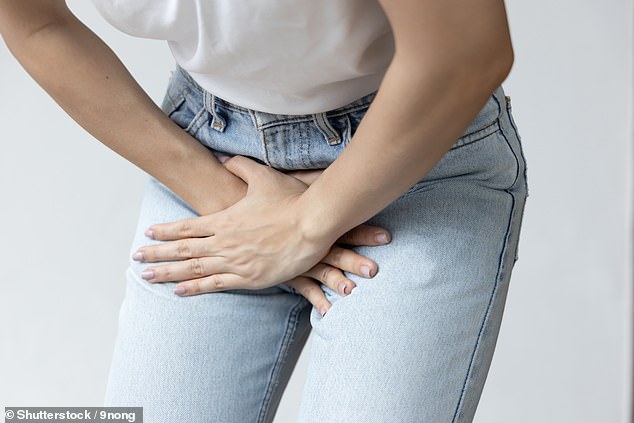Women make a mistake at the gym that could leave them with a painful infection, doctor warns
Tight shorts and leggings may be perfect for working up a sweat during a spinning class, but they can also be the cause of a painful infection, doctors warn.
That’s because post-workout sportswear, made of synthetic material, is the perfect environment for harboring bacteria.
And if you stay in your damp gym clothes for too long after a workout, you risk developing a condition called cystitis.
Bladder infections affect as many as one in three women and are the most common type of urinary tract infection (UTI).
Pain, a burning and stabbing sensation when urinating, as well as the need to go to the toilet often and urgently, are telltale signs of the infection.
Sweaty sportswear made from synthetic fabrics is the perfect environment for bacteria, doctors warn. Stock image

If you stay in your damp gym clothes for too long after a workout, you run the risk of developing a bladder infection. Stock image
Cystitis occurs when bacteria enter your bladder through your urethra, the tube that carries urine out of your body.
This can happen when bacteria that naturally occur in the rectum or vagina spread to the opening of the urethra.
Sportswear is often made from synthetic fabrics that are not breathable, so when someone sweats, moisture is trapped and provides the perfect breeding ground for bacteria.
Because leggings are also tight against the crotch, the urethra and the surrounding area can come into contact with friction during exercise.
This, combined with the sweaty and humid environment downstairs and possible dehydration, increases the risk of the bacteria spreading to your urethra and causing an infection in the bladder.
“Sportswear, such as leggings, is tight against the crotch and allows little air to pass through, so bacteria can thrive there,” explains Dr. Catherine Hood Women’s Health Expert and Advisor. Effercitrate tabletsa brand of medicine for bladder infections.
She added: ‘The materials that activewear is usually made of are not breathable. Synthetic fabrics such as nylon and lycra retain moisture, which is an ideal breeding ground for bacteria.’
However, this is only a problem if you stay in sweaty and damp gym clothes for too long.
That’s why Dr. Hood urges women to change immediately after exercising to reduce the risk of this.
“To prevent your workout clothes from becoming a burden, avoid staying in sweaty clothes for too long and change quickly after exercise,” Dr. stressed. Hood.
She also urged women to wash their genitals with water after exercise, but added to avoid bubble baths, talcum powder and feminine wipes as these can cause irritation.
Estimates suggest that a third of women will develop bladder infections by the time they reach the age of 24. However, it is more common during pregnancy, in women who are sexually active and after menopause.
There are several symptoms to look out for when it comes to bladder infections.
In addition to the burning or stinging sensation when urinating, other symptoms of cystitis include frequent urination but little or no urination, cloudy, dark or strong-smelling urine, pain in the lower abdomen, incontinence, high temperature and generally feeling not feeling well,” Dr. Hood said.
Mild cases will often get better on their own within a few days.
However, some people experience frequent episodes of bladder infections and may need regular or long-term treatment.
There is also a chance that cystitis can lead to a more serious kidney infection in some cases. So it is important to seek medical advice if your symptoms do not improve.

Estimates suggest that a third of women will have had bladder infections by the time they reach the age of 24, but it is more common during pregnancy, in women who are sexually active and after menopause.
Mild cases can be treated by drinking plenty of water, avoiding sex and taking paracetamol. But if the complaints persist, the doctor can write a prescription for a three-day course of antibiotics.
In addition to quickly changing out of gym clothes, wearing breathable cotton underwear can also help, explains Dr. Hood off.
She adds that “wiping from front to back” after urination will help prevent the spread of bacteria in your urinary tract and vagina, as will washing your genitals before and after sex and emptying your bladder.
‘Try to empty your bladder after sex. Also, when you urinate, lean back on the toilet and wait for the last few drops to disappear,” Dr. Hood said.
“It’s best not to have sex at all while you have a bladder infection because sex can cause friction and irritation in the urethra, which is sensitive during an infection,” she added.
Staying hydrated is also essential to prevent bladder infections.
‘Aim for two liters of water a day, including a large glass of water last before you go to bed and first thing when you get up, as well as after sex,’ advises Dr Hood.
‘Drinking water strengthens your urine flow and reduces the chance of bacteria sticking to the wall of your bladder and urinary tract. In addition, drinking enough ensures that you urinate more, which helps to flush away bacteria.’
